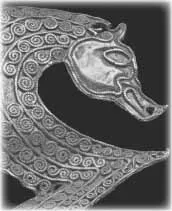![]()
THE EXETER BOOK
![]()
INTRODUCTION
I am a sheaf of songs scribbled on the cow’s skin
By once-wing darting from horn to hide,
Old as a millennium in a holy house in Exeter.
I hold in my arms Advent and Ascension,
A monk on a hillside, a panther and whale,
A Christlike bird, a soul and body,
A plethora of riddles—prayer and plow,
Bagpipe and Bible, moon and sun,
Iceberg and bellows, a bawdy onion,
Fish and river, sword and shield,
Cock and hen, bow and bookworm.
Sometimes a wife cries out in me—
Her husband responds with a gift of runes.
Sometimes I celebrate beautiful towns,
Sometimes I cry at the edge of ruins.
Once I was wounded by sharp knives,
Stained by beer or a glob of glue,
Used as a hot-plate and a filing cabinet
For precious gold leaves. I last longer
Than any author. Say who I am
Who sings mouthless to the minds of men.
The Exeter Book is a manuscript collection of poems in the Library of the Dean and Chapter of Exeter Cathedral in Exeter, England. Muir notes that “the combined codicological and literary evidence indicates that the anthology was designed and copied out circa 965–75, making it perhaps the oldest surviving book of vernacular poetry from Anglo-Saxon England” (1). The first known owner of the book was Bishop Leofric, who died in 1072. Before his death, Leofric drew up a list of items he intended to donate to the cathedral, including i mycel englisc boc be gehwilcum þingum on leoðwisan geworht, “a great English book about various matters crafted in poetry,” which most scholars take to be the Exeter Book. The manuscript contains 130 folios. The first seven folios constitute introductory materials added at a later date from another manuscript. The Exeter Book proper occupies folios 8–130. There are missing gatherings between Guthlac B and Azarias: The Suffering and Songs of the Three Youths, and between Riddles 67 and 68 (my numbering) and possibly at the end of the manuscript after the last riddle. There are also missing folios in a number of places.
The manuscript is moderately damaged in a variety of ways. As Muir points out, this damage may be related to its very survival in later times when Old English manuscripts were considered of little value:
The condition of the manuscript suggests that it has survived only because it could be put to practical use in the scriptorium: it was used as a cutting board (as the slashes on its front leaves show); a messy pot (perhaps of glue) was placed on its exposed first folio on at least one occasion; a fiery brand was placed on its exposed back with apparent indifference; and the sheets of gold leaf were often stored between its folios, leaving a sparkling residue of gold on many of its leaves. (2)
The manuscript has, like one of the creatures in the Exeter Book riddles, shifted shapes and survived by means of its transformations.
Whether the Exeter Book is a consciously crafted anthology of related poems or an arbitrary miscellany of unrelated poems is a matter of continuing debate. N. F. Blake, for example, says that “the Exeter Book differs from the other three poetic codices in that it is a poetic miscellany in which there does not appear to have been a recognisable principle of selection” (1990, 2). Muir believes that the anthology is arranged in a meaningful manner, contending that the first eight poems are “related thematically in their concern with different models for Christian living” and arguing that there is “a strong thematic link in the series of poems from Judgement Day I to Homiletic Fragment II, all of which are concerned with aspects of the Easter liturgical season” (23).
There are elements of both order and arbitrariness to the collection. The book opens with a series of long religious poems, and these share certain themes with some of the later, shorter poems such as Vainglory and The Descent into Hell, but not with the more secular poems such as the down-to-earth, and sometimes bawdy, riddles. The poems we now call elegies occur reasonably close together and share certain religious and philosophical themes with the opening poems—yet they are also quite different in their use of a developed narrative persona. The poems with refrains, Deor and Wulf and Eadwacer, occur together. The riddles are not randomly placed throughout the book but collected in three sections, though two are substantial and one is mysteriously short. In the short section, Riddle 58, the reed-pen or rune-stave riddle, has probably been placed next to The Husband’s Message because both poems mention runes or letters or may have been considered riddles. Some poems that seem thematically connected, such as The Wife’s Lament and The Husband’s Message, are separated by other poems. Finally, it is not possible to see order everywhere in the Exeter compilation, just as it is not possible to view the collection as a random miscellany.
This juxtaposition of order and arbitrariness is often an element in the poems themselves. Gnomic poems or maxims, for example, are usually a catalogue of characteristics, trait...

